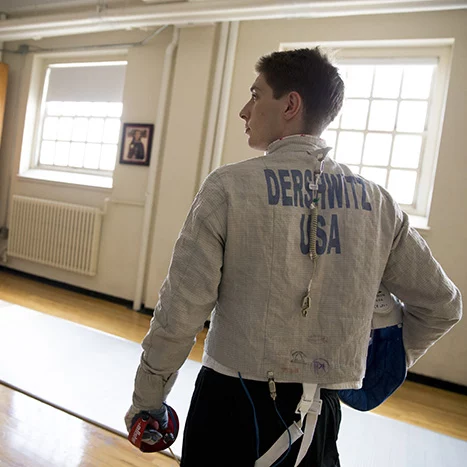Meet The Jewish Harvard Student Going for Gold in Rio

Fencer Eli Dershwitz practices for the 2016 Olympics in Rio (Photo: Rose Lincoln/Harvard University)
While many college students are excited to tune into the 2016 Olympics lounging in their living rooms, Eli Dershwitz will enjoy a closer view. The Harvard student, 20, will compete for gold as part of the U.S. Olympic Fencing Team in Rio.
Dershwitz began college at Harvard University in 2014. During his freshman year, Dershwitz competed in Harvard’s fencing team. This past year, Dershwitz took a year off from Harvard so he could train full time for the Olympics.
An Olympic gold medal would add to Dershwitz’s collection of trophies: Pan American Games Teams 2015 (gold for individual and team), Pan American Championship Teams 2014 (gold) and 2013 (gold for team) and Junior World Championship Teams 2015 (gold for individual). He currently ranks #1 in the United States.
Before Dershwitz flew to Germany for a training camp with athletes from countries all over the world, he discussed his Harvard experience and fencing career with Hillel International. Here are highlights from that conversation.
How did you get into fencing?
My brother found fencing at a summer day camp he went to when he was a kid. He really enjoyed it so he looked for a club where he could continue, and it just so happened that there was a high-level club with a former Olympic coach just 10 minutes from my house. I decided I wanted to give the sport a try. At first, it was just a recreational activity for me. But, as the years went by, I got more interested and more competitive as I went from competing on a local level, to a state level, to national competition, all the way to international events.
What kind of sword do you use in fencing, and how did you decide on it?
I fence saber, one of three weapons (the others are foil and epee). Saber is the only weapon taught at my club. Also, saber is the most fast-paced of the three weapons, and requires the least amount of patience as most touches last only a few seconds because of how fast it is. I really liked saber growing up because of how much speed and agility is needed in order to move fast, while also being able to change directions at any time.
How do you feel about competing at the upcoming Olympics in Rio?
I am excited to represent my country, my sport and the Jewish community at a sporting event that brings the entire world together in peace. I am also a little nervous about how my hard work will pay off. I am also in awe of the opportunity to be part of the most prestigious sporting event in the world at the age of 20. Rio is the culmination of my journey so far, but my plans of competing at this level extend further than the 2016 Olympics.
Tell us a little about your Jewish story.
I am the grandson of two holocaust survivors. My maternal grandmother was born in Tarnow, Poland and survived the war hidden in a barn with her family by a Polish gentile farmer and his family. My maternal grandfather was born in Jaslo, Poland. He and his family fled Poland and moved eastward before settling in Samarkand, Uzbekistan. I grew up going to a Conservative synagogue in Natick, Mass. My twin sister and I had our b’nai mitzvah in November 2008. I celebrate the Jewish holidays with my extended family and consider myself a proud member of the Jewish community.
Do you participate with Harvard Hillel?
I have attended Rosh Hashanah services, Yom Kippur break fasts and a few Friday night dinners. My hectic international travel and practice schedule makes it hard to go as much as I would like.
How do you feel about being a Jewish Olympic athlete?
I feel proud to be a Jewish-American Olympic athlete. The Jewish community has been very supportive throughout my journey to the Olympics, and I look forward to representing them on the world stage.
How has Harvard fencing prepared you for the Olympics?
Harvard was extremely helpful in preparing me physically for my rigorous training program over the past year. The strength and conditioning program at Harvard was a huge improvement over the strength and conditioning I was doing in high school. On top of that, the Harvard fencing team and all the coaches were extremely supportive of my Olympics goals, and helped me to prepare through a year of college practice and competition. Because Harvard is not far from where I grew up, I was also able to work at home with my personal lifelong coach, Zoran Tulum, on a frequent basis.
How has your full-time training this past year prepared you for Rio?
I have had the chance to dedicate an unlimited amount of time to improving my fencing. This meant extra physical conditioning and strength building, as well as practicing my footwork, technique, speed and other aspects of fencing to put me in a place where I really believe I have the tools that I need to succeed in Rio.
What are your plans after Rio?
I will return to Harvard six days after closing ceremonies as a sophomore. I plan on going back to school and competing on the NCAA circuit, as well as continuing to compete on the U.S. National Team in preparation for the 2020 Tokyo Olympic Games.